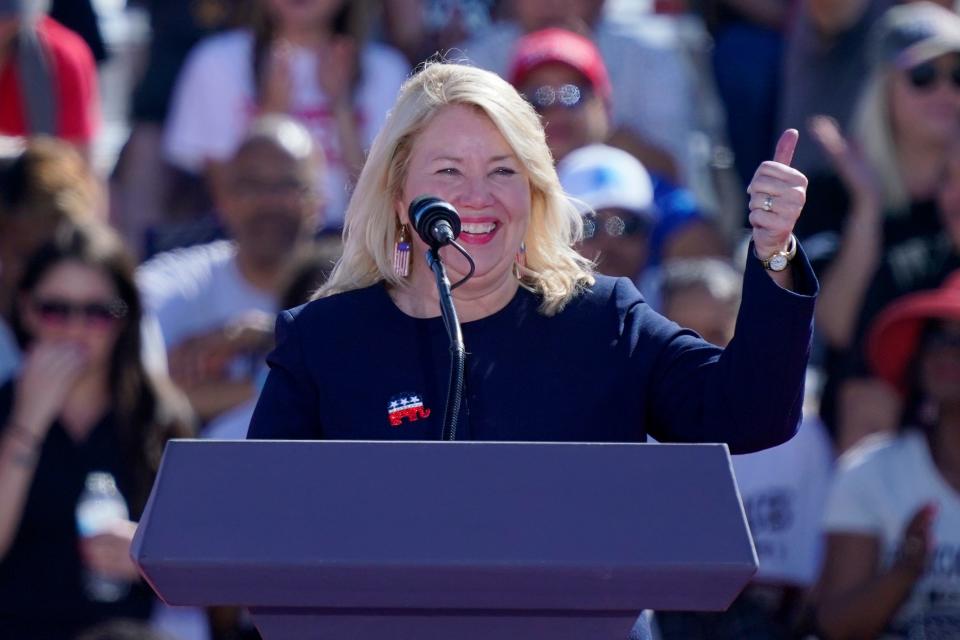TikTok ban bill splits Arizona's congressional delegation in a different way. Here's how
- Oops!Something went wrong.Please try again later.
- Oops!Something went wrong.Please try again later.
- Oops!Something went wrong.Please try again later.
Arizona's congressional delegation split, even among members of the same party, on legislation that passed the House of Representatives Wednesday that would ban the popular social media app TikTok if the parent company doesn't sell.
Because of the company's ties with China through its parent company, ByteDance, which is based in Beijing, U.S. officials for years have been concerned about potential national security threats related to the app.
At the end of his White House term four years ago, former President Donald Trump wanted to ban TikTok in the U.S. However, ultimately nothing came from it after the company sued and President Joe Biden took office.
Although the company said it now uses a separate, U.S.-based entity to store its American user data, the issue again has emerged on the national stage.

How did the U.S. House vote on the TikTok bill?
The Protecting Americans from Foreign Adversary Controlled Applications Act was introduced in the House last week by Rep. Mike Gallagher, R-Wis., and quickly moved through the House and onto the floor. A few days after it was introduced, Biden said he would sign the legislation if it made it to his desk.
The bill passed the House floor on Wednesday on a bipartisan vote of 352 to 65. Arizona's delegation also remained split on the vote, regardless of party.
More: Who voted to ban TikTok? See how your Representative voted in the US House Wednesday
Here's how the vote broke down among Arizona's House delegation.
Rep. Andy Biggs, R-Ariz.
Biggs voted no on the legislation.
"This bill is not a serious attempt to thwart China’s influence or data collection in the United States," Biggs said in a written statement explaining his vote. "It’s a micro step that only gives the appearance of protecting Americans from adversarial nations while doing little more than forcing divestiture of China’s ownership in the data collection company."

Biggs emphasized that the proposed law would not be effective.
“Touting this as a ‘win’ while China controls our supply chains and our access to critical minerals, facilitates the flow of fentanyl into the country, and owns our national debt is almost laughable," he said. "Not to mention that they’ll continue to have access to the same data collected by TikTok through other sources. It’s time we get serious about restoring our independence from China and truly protecting Americans’ privacy from both foreign and domestic spying agencies."
Rep. Juan Ciscomani, R-Ariz.
Rep. Juan Ciscomani, R-Ariz., voted for the TikTok bill.
"The Chinese Communist Party has made it clear that TikTok is a tool for them to collect data & surveil Americans," he said in a written statement. "To many, TikTok might just be another app in their pocket but when a platform like this has close ties to our foreign adversaries, it becomes a national security threat. Our foreign adversaries do not deserve to live on our phones, which is why I supported today’s legislation to push TikTok to divest from their CCP-controlled ByteDance."
Rep. Eli Crane, R-Ariz.
Rep. Eli Crane, R-Ariz., voted in favor of the legislation.
Rep. Ruben Gallego, D-Ariz.
Rep. Ruben Gallego, D-Ariz., who this year is running for the Senate, voted against the legislation.

Citing concerns around the legislation restricting Americans' freedoms, Gallego said that "banning TikTok and limiting the freedom of Arizonans before exploring other options is not the answer," in a written statement.
"It's vital we find a balance that both protects our national security interests and respects our fundamental rights," Gallego said. "This is not that."
Rep. Paul Gosar, R-Ariz.
Rep. Paul Gosar, R-Ariz., did not vote.
Rep. Raúl Grijalva, D-Ariz.
Rep. Raúl Grijalva, D-Ariz., also didn't vote.
Rep. Debbie Lesko, R-Ariz.
Rep. Debbie Lesko, R-Ariz., supported the legislation.
Lesko announced her vote on X, formally known as Twitter. She called the bill "very important legislation" aimed at "one of our most dangerous national security threats."

Rep. David Schweikert, R-Ariz.
Rep. David Schweikert, R-Ariz., joined Biggs and Gallego in voting no.
"Personal data should be considered a property right," Schweikert said on X. "I’ve introduced legislation previously to protect Americans’ data privacy and prevent their personal information from ending up in the hands of those who exploit us."
Rep. Greg Stanton, D-Ariz.
Rep. Greg Stanton, D-Ariz., voted yes.
Stanton said in a statement to The Arizona Republic that he voted in favor of the bill "to make sure American people can continue using TikTok safely and securely."

Additionally, Stanton emphasized the potential national security threat of the popular platform.
“We cannot allow a foreign adversary to collect sensitive data on millions of Americans, or use this platform to spread misinformation to undermine our democracy," Stanton said.
What's next?
The TikTok bill now goes to the U.S. Senate, where it likely has an uphill battle. If the Senate does approve it, ByteDance will have six months to sell off TikTok or face a ban in the United States.
Arizona's senators have not made their intentions surrounding the legislation clear yet.
“As a member of the Senate Intelligence Committee, Senator Kelly is well aware of the national security concerns of foreign governments exploiting technology used by Americans," a Kelly spokesperson said. "He is reviewing the legislation closely.”
Reach reporter Morgan Fischer at morgan.fischer@gannett.com or on X, formally known as Twitter, @morgfisch.
This article originally appeared on Arizona Republic: TikTok ban bill splinters Arizona's congressional delegation

